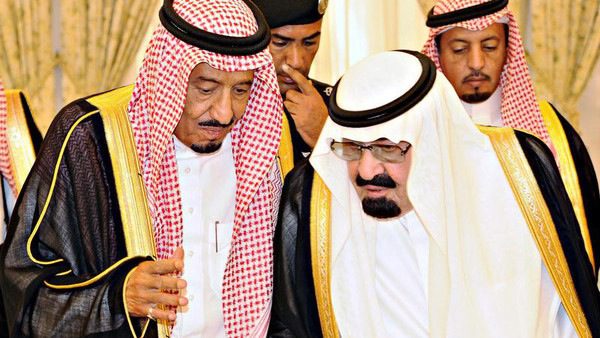How Stable Is Saudi Arabia?

King Salman inherits a mess, says the WaPo:
No king of Saudi Arabia has ascended the throne amid more regional turmoil than King Salman, who was crowned Friday upon the death of his brother King Abdullah.
With war raging in Syria and tensions with Iran increasing, Saudi Arabia is threatened by a disintegration of the national government in Yemen across its southern border and by the Islamic State militants who are dominating the Iraqi desert just over its northern border.
Salman indirectly mentioned the threat of rising violence and regional instability on Friday in his first speech to the Saudi people, saying that “the Arab and Islamic nation is in dire need today to be united and maintain solidarity.”
Militants have staged four attacks inside the kingdom in the past six months, resulting in the deaths of eight civilians, 11 police or border guards and 13 militants, according to Saudi officials.
As in the recent attacks in Paris on the Charlie Hebdo satirical newspaper and a kosher supermarket, most of the Saudi attacks have been carried out by homegrown radicals influenced or trained by the Islamic State, al-Qaeda or other extremist groups. Saudi authorities said that they have arrested 293 people in connection with the incidents and that 260 of them are Saudi nationals.
Germany has decided to stop arms exports to Saudi Arabia because of “instability in the region,” German daily Bild reported on Sunday.
Weapons orders from Saudi Arabia have either been “rejected, pure and simple,” or deferred for further consideration, the newspaper said, adding that the information has not been officially confirmed.
The decision was taken on Wednesday by the national security council, a government body that includes Chancellor Angela Merkel, Vice Chancellor Sigmar Gabriel and seven other ministers, it said.
“According to government sources, the situation in the region is too unstable to ship arms there,” added the daily.
Military analyst John Robb continues to argue that the Kingdom of Saudi Arabia is a lot more vulnerable than many of us seem to think. Excerpt:
-
ISIS is an aggressively expansionist fundamentalist jihad. It kills, enslaves, or routs unbelievers, moderates, apostates, etc. wherever it finds them, which is the ultimate manifestation of Wahhabi fundamentalism.
-
Unfortunately for the KSA, this is the same belief system underlying the legitimacy of the House of Saud and the same fundamentalism the Kingdom has spent the last century beating into the heads of their subjects.
-
This means that ISIS is moral kryptonite. A kryptonite built specifically to kill the Kingdom of Saudi Arabia. A kryptonite that breaks down the moral cohesion that binds the KSA together. A kryptonite that creates competitive centers of gravity that will rip the country apart.
Did you know that half the Saudi population is 25 or younger? Did you know that the youth unemployment rate in the Kingdom is staggeringly high, with little realistic prospect of that changing? You can buy people off for a while, but they’re not going to be willing to live like that forever. It’s insane, of course, to think that an ISIS-ruled Saudi Arabia would be better for people than the fundamentalist al-Saud regime, but people don’t think rationally in these situations.
Subscribe for as little as $5/mo to start commenting on Rod’s blog.